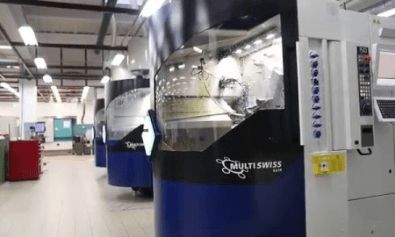"We have gone from 4% to 1.5% of scrap" Pierre Challamel, Head of the multispindle lathes at JOSEPH MARTIN

Reduced machine downtime, improved OEE and a clear reduction in scrap. "We have reduced our scrap rate from 4% to 1.5%", boasts Pierre Challamel, head of the numerically controlled multispindle lathes at Joseph Martin, a bar-turning company based in Vougy and Bonneville, Haute-Savoie. With inspection times now spaced out every hour instead of every 20 minutes, this automotive subcontractor, which employs 190 people, certainly doesn't regret having been the first bar turner to implement the Ellistat SPC software, which its publisher Ellistat, also from Haute-Savoie, had deployed mainly in the watchmaking sector. Much more than an SPC, this software based on Automated Process Control (APC), a standard created by Ellistat, automatically adjusts machine tools based on the measurement of a part, by calculating the corrective factors to be applied. This young company based in Chavanod began its activity by advising on the use of SPC to manage production. This led to its initial involvement with Joseph Martin. "At the same time, we were developing our own Automated Process Control solution with the aim of improving production quality, which is why I came back to meet them," recalls Davy Pillet, the founder of Ellistat. As a user of an 'ageing' SPC software, Joseph Martin was looking for a replacement solution. In 2018, the software was tested on an Index MS22-6 multispindle lathe, which produces components for Volkswagen's DSG dual-clutch electronically controlled gearboxes. A laptop PC is connected to a series of electronic control instruments (comparators and other micrometers). "With our inspection equipment connected, the measurements are fed directly into Ellistat's APC module, which automatically calculates the corrections to be made to the machine. Then it's up to the operator to programme the new parameters on the CN3", explains Managing Director Laurent Martin. As Joseph Martin works to IATF 16949, the international standard for quality management systems in the automotive industry, training operators in SPC is essential. "Each operator must be able to explain to the auditor how he controls his machine using the SPC," explains Laurent Martin. Especially since their last renewal audit, they have been asked "to justify and record all the dimensions we measure", adds Pierre Challamel. And with Ellistat's APC module, I can save them very simply. Since the initial tests, seven multispindle lathes out of a total of 28 are now controlled by the Ellistat APC module. In the light of such good results, there's no doubt that the bar turner will very quickly duplicate the APC principles on the rest of his machines.
Article written by Jérôme Meyrand for Machines Production
